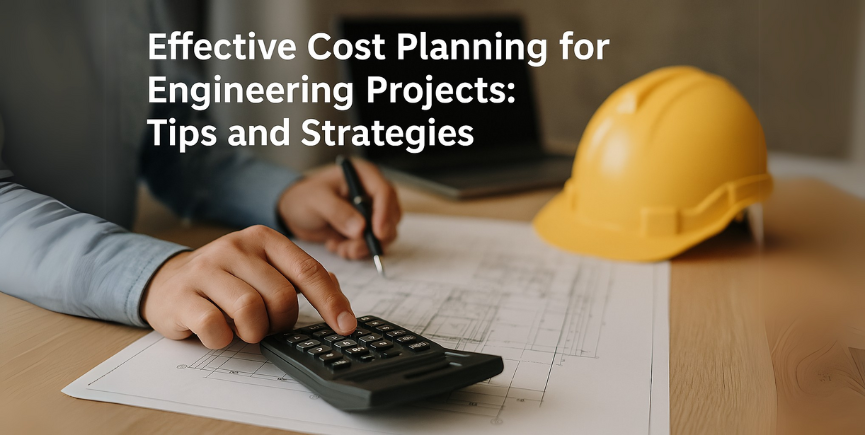Effective Cost Planning for Engineering Projects: Tips and Strategies

In the dynamic field of building services engineering, effective cost planning engineering is the backbone of successful project delivery. Whether you’re overseeing a small renovation or a large-scale infrastructure project, managing the engineering project budget ensures financial stability and client satisfaction. At Decobu, a trusted team of engineering consultants in Perth, we specialize in delivering tailored cost management in construction solutions. Our expertise spans mechanical engineering services, electrical engineering services, hydraulic engineering design, and fire protection engineering. This blog provides actionable tips and strategies for effective cost planning engineering, empowering you to keep your projects on track financially.
What is Cost Planning in Engineering?
Cost planning engineering involves estimating, budgeting, and controlling costs throughout an engineering project’s lifecycle. It goes beyond simple budgeting, requiring a systematic approach to anticipate expenses, monitor spending, and adjust plans as needed. Effective cost management in construction ensures that projects remain within the engineering project budget while meeting quality and regulatory standards.
Key components include:
- Cost Estimation: Predicting total costs using historical data, industry benchmarks, and project specifics.
- Budget Allocation: Distributing funds across project phases or work packages.
- Cost Control: Tracking actual costs against the engineering project budget and addressing variances.
Risk Management: Planning for unforeseen expenses with contingency funds.
Why Cost Planning is Critical
Poor cost planning engineering can lead to budget overruns, project delays, or compromised quality, impacting client trust and project viability. Conversely, robust cost management in construction offers:
- Financial Control: Keeps projects within the engineering project budget, avoiding financial strain.
- Client Confidence: Demonstrates professionalism and reliability, fostering long-term relationships.
Project Success: Ensures timely completion and high-quality outcomes, as seen in Decobu’s mechanical engineering services and fire protection engineering projects.
Strategies for Effective Cost Planning
To achieve successful cost planning engineering, consider these proven strategies:
1. Start Early with Budgeting
Begin cost planning engineering during the project’s conceptual phase. Early budgeting identifies cost drivers and allows for adjustments before expenses escalate. Tools like Building Information Modeling (BIM) enhance accuracy by providing detailed visualizations of project requirements.
2. Conduct Detailed Cost Estimation
Accurate estimation is the foundation of cost management in construction. Use techniques like:
- Bottom-Up Estimating: Calculate costs for individual tasks and sum them for the total engineering project budget.
Parametric Estimating: Leverage historical data and project parameters for scalable cost predictions.
Incorporate both direct costs (materials, labor, equipment) and indirect costs (overhead, administration).
3. Incorporate Contingency Planning
Engineering projects often face risks like design changes, material price fluctuations, or regulatory updates. Include contingency funds—typically 5-10% of the engineering project budget—to cover these uncertainties. This ensures financial resilience without compromising project goals.
4. Leverage Technology
Advanced tools like BIM and cost estimation software improve precision in cost planning engineering. BIM, for instance, simulates design changes and their cost impacts, helping engineering consultants in Perth like Decobu optimize budgets. Software like Microsoft Project can also track planned versus actual costs.
5. Conduct Regular Cost Reviews
Monitor spending against the engineering project budget using techniques like Earned Value Analysis (EVA). EVA compares planned value, earned value, and actual costs to identify variances early, allowing for timely adjustments. Regular reviews keep cost management in construction on track.
6. Foster Stakeholder Collaboration
Engage clients, contractors, and team members in cost planning engineering to ensure alignment. Transparent communication prevents scope creep and ensures all parties understand budget constraints. Regular meetings and reports enhance collaboration, as practiced in Decobu’s hydraulic engineering design projects.
Common Pitfalls and How to Avoid Them
- Underestimating Costs: Use detailed estimation and historical data to account for all expenses, including indirect costs.
- Scope Creep: Define clear project scopes and involve stakeholders early to prevent unauthorized changes.
- Inadequate Contingency: Allocate sufficient contingency funds based on project complexity and risk profile.
- Lack of Monitoring: Conduct frequent reviews to catch deviations early, ensuring cost management in construction remains effective.
Decobu’s Expertise in Cost Planning
As leading engineering consultants in Perth, Decobu integrates cost planning engineering into every project. Our team excels in mechanical engineering services, electrical engineering services, hydraulic engineering design, and fire protection engineering, using tools like BIM and EVA to deliver precise cost management in construction. Our local expertise in Perth’s construction landscape ensures budgets align with regional regulations and environmental conditions, as demonstrated in projects like commercial fit-outs and healthcare facilities.
Conclusion
Effective cost planning engineering is essential for delivering engineering projects on time and within budget. By adopting early budgeting, detailed estimation, contingency planning, and regular reviews, you can achieve financial success. Decobu is committed to providing expert building services engineering solutions, ensuring your engineering project budget is optimized. Contact our engineering consultants in Perth at Decobu’s contact page to discuss your project’s cost planning needs and schedule a consultation.
Found Interesting? Share the insights
Related Posts

Fire Engineering in Australia: NCC Compliance, Performance Solutions & When You Need a Fire Engineering Consultant
Fire Engineering in Australia: NCC Compliance, Performance Solutions & When You Need a Fire Engineering Consultant Introduction Fire engineering is a critical component of modern

Why Multi-Discipline Engineering Companies in Melbourne Deliver Better Project
Why Multi-Discipline Engineering Companies in Melbourne Deliver Better Project As engineering companies in Melbourne, we see the same pattern across projects of all sizes: developments

How Strong Building Services Design in Melbourne Supports Better Developments
How Strong Building Services Design in Melbourne Supports Better Developments As building services design engineers in Melbourne, we see the same pattern repeatedly: projects that

How Mechanical Engineering Consulting Improves Energy Efficiency in Commercial Projects
How Mechanical Engineering Consulting Improves Energy Efficiency in Commercial Projects Commercial buildings across Australia face increasing pressure to reduce energy use while keeping occupants safe

Why Every Commercial Project Needs an Experienced Electrical Design Engineer
Why Every Commercial Project Needs an Experienced Electrical Design Engineer Electrical design is one of the most influential parts of any commercial development yet it’s

Why Early Hydraulic Engineering Services Matter for Australian Construction
Why Early Hydraulic Engineering Services Matter for Australian Construction Hydraulic systems sit at the core of every building — managing water supply, drainage, stormwater, gas,

